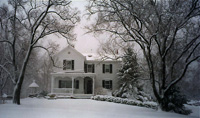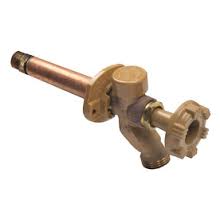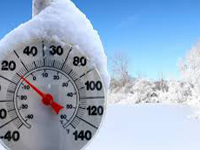Prolonged, extreme cold winter weather can be hard on your home. Here are some tips for weathering the winter.
How to Avoid Frozen Pipes
- Disconnect and drain the garden hoses.

- Cover outside faucets with insulating foam covers.
- Turn off the water to the outside faucets if you have an interior valve, and open the spigots to allow them to drain.
- Install freeze proof faucets to protecting your exterior faucets from freezing and bursting.
- Turn off the sprinkler system and blow compressed air through the lines to drain them.
- Cover any foundation vents if you have a crawl space.

- Keep your garage doors closed when they are not in use.
- Insulate any exposed pipes you may have in your crawl space.
- Know where your water main shut-off valve is and verify that it is working properly.
- After the weather has warmed above freezing check your pipes to verify you have no leaks.
How to Keep Your Home Warm
- Have your furnace cleaned and inspected before cold weather arrives.
- Inspect the heat exchanger for cracks.
- Replace your air filter.
- Verify the thermostat is working properly.
- Have your fireplaces and chimneys cleaned and inspected before using.
- Keep drapes and blinds closed, except when windows are in direct sunlight.
- Consider installing energy efficient replacement windows.
- Remove any window air conditioners.
- Insulate electrical outlets and switches on exterior walls.
- Caulk or seal any cracks or holes on the outside of your house.
- Repair or replace weather stripping and thresholds around doors and windows where necessary.
- Run ceiling fans on low in reverse so they are pulling air up to circulate the warm air on the ceiling.
- If you heat with propane or fuel oil, make sure the tank is full.
- If you heat with wood or coal, have plenty of fuel on hand.
How to Protect the Outside of Your Home
- Clean your gutters and downspouts before cold weather arrives to prevent ice from forming.
- Have salt or an ice repellent solution on hand for steps and walkways.

- Check antifreeze levels, freeze resistant windshield wiper fluid, and the battery condition of your vehicles.
- Check air pressure in tires, since cold weather causes the pressure to lower.
- Make sure your vehicles have plenty of fuel.
- Drain birdbaths and fountains
How to Stay Safe in an Ice or Snow Storm
- Have plenty of nonperishable food and water on hand.
- Refill prescription medications in advance of storm.
- Charge cell phones.
- Have flashlights, batteries, a weather radio, and a manual can opener on hand.
- Make sure you have working smoke and carbon monoxide alarms.
- Have a working fire extinguisher on hand.
- Be sure to have the necessary fuel and oil on hand for equipment you may have such as chain saws, generators, snow blowers, log splitters, etc…
